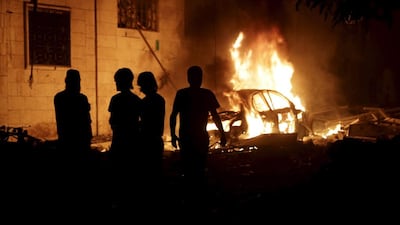This week, after Britain launched a drone strike that killed two of its citizens who were recruits for ISIL, foreign secretary Philip Hammond insisted that London was not planning to get involved in “complex three-way fights in north-west Syria”. But the truth is that a three-way fight is probably the simplest of all possible scenarios for Syria. With every passing day, the crisis gets more complicated, with new threats reverberating around the region and beyond.
The top-level fight is now between the United States and Russia. It emerged this week that the Russian military has supplied new fighting vehicles to the hard-pressed Syrian army, and is building up an airbase near the port of Lattakia, with housing for hundreds of troops. Some analysts believe that Russian aircraft may be about to bomb the regime’s enemies. Washington has twice warned Moscow that its actions carry the risk of “confrontation” with US-backed rebel forces.
Under US pressure Bulgaria has blocked Russian aircraft flying over its territory on the grounds that they are carrying military supplies. Moscow is now rerouting these flights through Iran. These actions have destroyed Barack Obama’s hopes that Russia would help the US in removing Bashar Al Assad.
The need for stepped up Russian support is not hard to find. This week the regime admitted it had withdrawn from its last base in Idlib province, leaving it in rebel control except for a couple of villages defended by pro-regime militias.
Meanwhile the minds of Europeans have focused on the tens of thousands of migrants – many of them Syrians – who are making their way to Germany and Sweden in search of asylum. While the European Union is still offering refugee status, the numbers are testing the limits of its welcome. Germany alone expects 800,000 asylum applications this year.
Some European governments are responding with panic reactions to show that they can – against all evidence – control the crisis. France has begun flying reconnaissance missions over Syria and is set to join the Americans in bombing raids on ISIL targets, arguing that the migration crisis can only be ended “at source”. If the raids are directed only at ISIL, this is unlikely to make much difference: the Syrian Network for Human Rights reports that in the first seven months of this year the Syrian military and pro-government militias killed 7,894 people, many of them with barrel-bombs dropped by helicopters, while ISIL killed 1,131.
Britain is going through diplomatic contortions to do the same as France. David Cameron’s government wants to secure parliamentary approval for bombing ISIL in Syria, reversing a 2013 vote against intervention.
Mr Cameron announced on Monday that a RAF drone strike last month had killed two British Muslims who had featured prominently in ISIL videos, on the grounds that this was an act of self-defence to prevent them plotting terror attacks in Britain. The summary killings – carried out without parliamentary approval – were revealed at the same time as the announcement that Britain would accept 20,000 Syrian refugees over five years. This was no coincidence: the appearance of acting tough abroad was a counterweight to the not universally popular move to accept even a small number of refugees.
Meanwhile Turkey – a Nato member and key ally of the US – is fighting its own war against Kurdish separatists inside the country and their allies inside Syria. This side war has broad implications for the success of western strategy: the Kurdish militias in Syria are America’s most effective strike force against ISIL.
From this rat’s nest of competing interests and electoral calculations, one conclusion is clear. Russia has followed a consistent policy all along. It supports the Syrian regime against what it calls “terrorists” – though it is not necessarily committed to Bashar Al Assad as president for life – and is just upgrading that support. The Russian president, Vladimir Putin, has just launched his own peace proposal calling for elections in Syria, and dialogue with “healthy members of the opposition”, which can be understood as regime patsies.
By contrast, the US has never shown any coherence in its policy, having begun the crisis saying Bashar Al Assad should go, while not putting any military force behind this position.
All sides can agree that ISIL must be destroyed. But there the agreement ends. For Moscow and Iran, the Syrian regime is the only force that can crush the extremists and terrorists. The West is confused. It sees ISIL taking over Damascus as a greater threat than the continued existence of the Assad regime, but it cannot get itself off the hook of having declared that Bashar must go. Nor are America’s Arab allies ready to accept a Washington embrace of the regime.
Having failed to create any serious military force in the conflict, the western powers now find that Mr Putin is moving in to the vacuum. For all his talk of defeating terrorism, Mr Putin can hardly resist the chance to teach America a lesson in power politics or, as the Russian proverb has it, to keep ladling tar into Mr Obama’s honeypot.
The western position is weak, partly due to justified reluctance to get involved in a many-cornered struggle where even good intentions will be seen as neocolonialism.
The British government now has a plan calling for the removal of both ISIL and Mr Al Assad. ISIL must be defeated by “hard military force” and the Syrian regime replaced with a government of national unity, with Mr Al Assad remaining in office for a transitional period of six months, as a sop to the Russians. This proposal recognises that the Russians cannot be ignored over Syria.
But it still leaves many questions unanswered: whose hard military force is going to defeat ISIL, which factions will join the new government, and what will happen to the Syrian security forces that have destroyed half of their own country? Alan Philps is a commentator on global affairs
On Twitter: @aphilps

